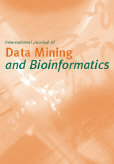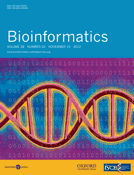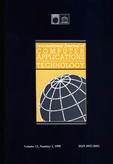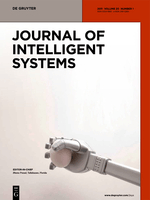
International Journal of Data Mining and Bioinformatics
Scope & Guideline
Advancing Knowledge in Data Mining and Bioinformatics.
Introduction
Aims and Scopes
- Data Mining Techniques and Applications:
The journal extensively covers a variety of data mining methods and their applications across different domains, emphasizing the use of artificial intelligence and machine learning in extracting valuable insights from large datasets. - Bioinformatics Innovations:
It focuses on advancements in bioinformatics, exploring computational approaches to analyze biological data, such as genomics, proteomics, and pharmacology, to enhance understanding of biological processes and disease mechanisms. - Interdisciplinary Research:
The journal promotes interdisciplinary research that integrates data science with fields like healthcare, environmental science, and economics, showcasing how data-driven approaches can address complex real-world problems. - Emerging Technologies in Data Science:
The journal highlights the role of emerging technologies, such as blockchain, edge computing, and IoT, in transforming data management and analysis, thereby improving efficiency and security in various applications. - Educational and Organizational Applications:
It also examines the application of data mining in educational settings and organizational decision-making, focusing on optimizing processes and enhancing learning experiences through data insights.
Trending and Emerging
- Artificial Intelligence and Machine Learning:
There is a significant increase in research applying AI and machine learning techniques to various domains, particularly in healthcare and finance, indicating a growing reliance on these technologies for data analysis and decision-making. - Big Data Analytics:
The emphasis on big data analytics has risen, with numerous studies dedicated to leveraging large datasets for insights in areas such as health security, disaster management, and consumer behavior. - Digital Economy Applications:
Research exploring the implications of the digital economy on business processes, such as e-commerce and financial management, is emerging as a key focus, reflecting the transformative impact of digital technologies. - Integration of IoT and Data Mining:
There is a growing trend in integrating IoT with data mining techniques, particularly for optimizing logistics and supply chain management, showcasing the importance of real-time data analysis. - Network Pharmacology and Drug Development:
The exploration of network pharmacology in drug discovery and disease treatment is becoming increasingly relevant, highlighting its potential to uncover complex biological interactions and therapeutic targets.
Declining or Waning
- Traditional Statistical Methods:
There seems to be a decline in the publication of papers focusing solely on traditional statistical methods for data analysis. As machine learning and AI techniques gain traction, the reliance on conventional statistics is waning. - Basic Bioinformatics Tools:
The exploration of basic bioinformatics tools and techniques has decreased, possibly due to the emergence of more sophisticated methods and frameworks that provide enhanced capabilities for data analysis and interpretation. - Single-Domain Focus Studies:
Research that focuses on single-domain applications of data mining, especially those that do not integrate interdisciplinary approaches, is less frequently seen, indicating a shift towards more complex, multi-faceted research questions. - Manual Data Processing Techniques:
Papers that emphasize manual or semi-automated data processing methods are becoming less common as the field moves towards fully automated solutions powered by artificial intelligence and machine learning. - Low-Impact Case Studies:
There is a noticeable decline in low-impact case studies that do not contribute significantly to theoretical advancements or practical applications, reflecting a trend towards more impactful and innovative research.
Similar Journals

Bioinformatics Advances
Pioneering Discoveries in Genomic Data AnalyticsBioinformatics Advances, published by Oxford University Press, is an esteemed academic journal that serves as a vital platform for the dissemination of innovative research in the rapidly evolving fields of bioinformatics and computational biology. With a promising E-ISSN of 2635-0041, this journal has made significant strides since its inception in 2021, achieving a commendable Q1 ranking in both the Computer Science Applications and Genetics categories, alongside respectable Q2 rankings in Molecular Biology and Structural Biology as of 2023. Though currently not an open-access publication, its critical insights cater to an audience keen on advancing knowledge and technology in genomic studies and data analytics. The journal emphasizes high-quality research and aims to facilitate the integration of computational techniques within biological sciences, making it an essential resource for researchers, professionals, and students alike who seek to stay at the forefront of bioinformatics advancements.

DATA & KNOWLEDGE ENGINEERING
Leading the Charge in Data Management ExcellenceData & Knowledge Engineering is a prestigious, peer-reviewed journal dedicated to the fields of data management, information systems, and knowledge engineering. Published by Elsevier in the Netherlands, this journal serves as a critical resource for researchers, professionals, and students alike, offering a platform for high-quality, original research and innovative approaches in the realm of data-driven technologies and methodologies. With a considerable impact factor and classified in the Q2 quartile for Information Systems and Management, it ranks 47th out of 148 journals in its category, placing it in the esteemed 68th percentile according to Scopus metrics. Data & Knowledge Engineering covers a wide array of topics including database systems, data mining, and knowledge representation, ensuring that it remains at the forefront of advancing understanding and application in these dynamic fields. Engage with compelling articles and significant findings published since its inception in 1985, as the journal continues to shape the future of data-centric research up to 2024 and beyond.

JOURNAL OF COMPUTER SCIENCE AND TECHNOLOGY
Catalyzing Knowledge in Computer Science and EngineeringJOURNAL OF COMPUTER SCIENCE AND TECHNOLOGY, published by Springer Singapore Pte Ltd, is a pivotal platform in the rapidly evolving realms of computer science and technology. With an ISSN of 1000-9000 and an E-ISSN of 1860-4749, this journal encompasses a diverse array of topics including computational theory, hardware and architecture, software engineering, and applications of computer science. Spanning over three decades from 1986 to 2024, it boasts an impressive standing within academic circles, ranking in the Q2 quartile across several key categories and achieving notable placement in Scopus metrics. Although this journal operates under a subscription-based model, it remains a crucial resource for researchers, professionals, and students seeking to advance their knowledge and contribute to discussions in computer science. The JOURNAL OF COMPUTER SCIENCE AND TECHNOLOGY is committed to fostering innovation and scholarly communication in the field, encouraging submissions that contribute substantive advancements in theory and application.

Journal of Integrative Bioinformatics
Pioneering Open Access to Transformative Bioinformatics KnowledgeJournal of Integrative Bioinformatics, published by WALTER DE GRUYTER GMBH, is a leading open-access journal that has been at the forefront of the field since its inception in 2004. With an E-ISSN of 1613-4516, it serves as a crucial platform for researchers engaged in the interdisciplinary study of bioinformatics, blending insights from biology, computer science, and mathematics. Based in Germany, the journal is recognized for its impact in the realm of general medicine, boasting a Scopus rank of #172 out of 636 and placing in the 73rd percentile of its category. The journal continuously strives to disseminate high-quality research contributions that unify experimental and computational approaches to address complex biomedical questions. Targeted towards academics, professionals, and students alike, the Journal of Integrative Bioinformatics provides essential access to innovative research that enhances our understanding of integrative methodologies in medicine and beyond, especially with converged years spanning from 2008 to 2024.

BIOINFORMATICS
Exploring the Synergy of Data and Life SciencesBIOINFORMATICS, published by Oxford University Press, is a leading journal in the realms of biochemistry, computational mathematics, and computer science, with a notable impact factor that underscores its significance in the field. Since its inception in 1985 and continuing through its expected convergence in 2024, the journal has maintained a prestigious reputation, proudly residing in the Q1 category across multiple disciplines, including molecular biology and statistics. With a Scopus ranking placing it within the top percentiles of its categories, BIOINFORMATICS serves as an essential platform for disseminating high-quality research that advances knowledge and innovation at the intersection of biology and computational sciences. This journal not only offers both subscription and open access options, ensuring wider availability of its cutting-edge research, but it has also become a crucial resource for researchers, professionals, and students aiming to stay at the forefront of bioinformatics and related fields. Explore the latest findings and trends that define the future of biological research through this esteemed publication, any inquiries regarding the journal can be directed to its offices located at Great Clarendon St, Oxford OX2 6DP, England.

INTERNATIONAL JOURNAL OF COMPUTER APPLICATIONS IN TECHNOLOGY
Connecting theory and practice in the realm of technology.International Journal of Computer Applications in Technology is a reputable academic journal published by InderScience Enterprises Ltd, dedicated to advancing the field of computer applications across various domains including Computer Networks and Communications, Computer Science Applications, and more. With an ISSN of 0952-8091 and an E-ISSN of 1741-5047, this journal has been a credible source of research since its inception in 1976, transitioning into its current form in 1988. With its consistent rank in the Q3 quartile for several key engineering and computer science categories in 2023, it highlights the significance of the journal and its contributions to ongoing discourse in these fields. Researchers benefit from its wide-ranging scope, which encompasses both theoretical and practical applications of technology, making it an invaluable resource for both industry professionals and academic scholars. Although it currently does not provide open access, the journal remains committed to disseminating high-quality research that is essential for technological advancement and innovation.

JOURNAL OF UNIVERSAL COMPUTER SCIENCE
Bridging disciplines through shared scientific insights.JOURNAL OF UNIVERSAL COMPUTER SCIENCE, published by Graz University of Technology's Institute for Information Systems and Computer Media (IICM), stands as a pivotal resource in the field of computer science. Since its inception in 1994, this Open Access Journal has fostered a culture of knowledge sharing and collaboration, allowing readers from all corners of the globe to access cutting-edge research without barriers. With an impressive convergence of studies spanning from 1996 to 2024, the journal covers a breadth of topics within Computer Science, achieving a Q3 ranking in miscellaneous areas and a Q4 ranking in theoretical computer science as of 2023. It also holds significant standing in Scopus rankings, demonstrating its influence and reach among the scientific community. The journal is particularly valuable to researchers, professionals, and students eager to explore innovative ideas and techniques that push the boundaries of computer science. Based in Austria, the journal is dedicated to maintaining high standards of scholarly integrity while promoting interdisciplinary discourse and advancements in technology.

Algorithms for Molecular Biology
Pioneering computational methods for a new era in biology.Algorithms for Molecular Biology, published by BMC, is a premier Open Access journal dedicated to advancing the field of molecular biology through innovative computational methods. Since its inception in 2006, the journal has provided a vital platform for researchers to share their findings and methodologies, covering a diverse range of topics at the intersection of applied mathematics, computational theory, and molecular biology. With a notable impact factor reflected in its Scopus ranks, including a Q2 classification in both applied mathematics and computational theory, as well as Q3 in molecular and structural biology, the journal plays an essential role in this rapidly evolving discipline. The wide accessibility of articles published under the Open Access model ensures that research findings reach a global audience, fostering collaboration and innovation amongst scientists and professionals alike. As we look towards converging years from 2006 to 2024, Algorithms for Molecular Biology continues to uphold the highest standards of scientific integrity and excellence, reinforcing its status as a key resource for those engaged in the profound complexities of molecular biology.

Quantitative Biology
Bridging Mathematics and Biology for Innovative DiscoveriesQuantitative Biology is a prestigious journal published by WILEY, focusing on the interdisciplinary study of quantitative approaches in the biological sciences. With an ISSN of 2095-4689 and an E-ISSN of 2095-4697, this journal has established itself as a critical platform for researchers exploring complex biological systems through mathematical and computational methodologies. Operating out of China, Quantitative Biology significantly contributes to its field, holding a Q2 ranking in various categories, including Applied Mathematics and Biochemistry, Genetics and Molecular Biology, according to the latest Scopus rankings. These rankings reflect the journal's commitment to publishing high-quality research that employs advanced modeling and simulation techniques. The journal's impact is evident with its position in the 84th percentile for Applied Mathematics, indicating its relevance and growth in a competitive academic landscape. Although it does not currently operate under an Open Access model, the journal is pivotal for professionals and students alike, aiming to bridge the gap between mathematical theories and biological applications. Researchers are encouraged to submit their innovative findings and engage with the vibrant community dedicated to advancing the quantitative understanding of biological phenomena.

Journal of Intelligent Systems
Empowering Innovation in Intelligent TechnologiesThe Journal of Intelligent Systems, published by DE GRUYTER POLAND SP Z O O, is a premier open access journal that has been at the forefront of advancements in the fields of Artificial Intelligence, Information Systems, and Software Engineering since its inception in 1991. With a commitment to disseminating high-quality research, the journal has been recognized in the 2023 category quartiles as Q3 in these critical areas, reflecting its relevance and impact in the academic community. The journal serves as a vital platform for researchers, professionals, and students interested in the evolving landscape of intelligent systems, offering insights into innovative methodologies and applications. As an open access publication since 2020, it ensures that research is readily available to a global audience, fostering collaboration and engagement within the scientific community. With a Scopus rank in the 65th to 69th percentiles across its categories, The Journal of Intelligent Systems continues to contribute significantly to the discourse on intelligent technologies and their implications for the future.